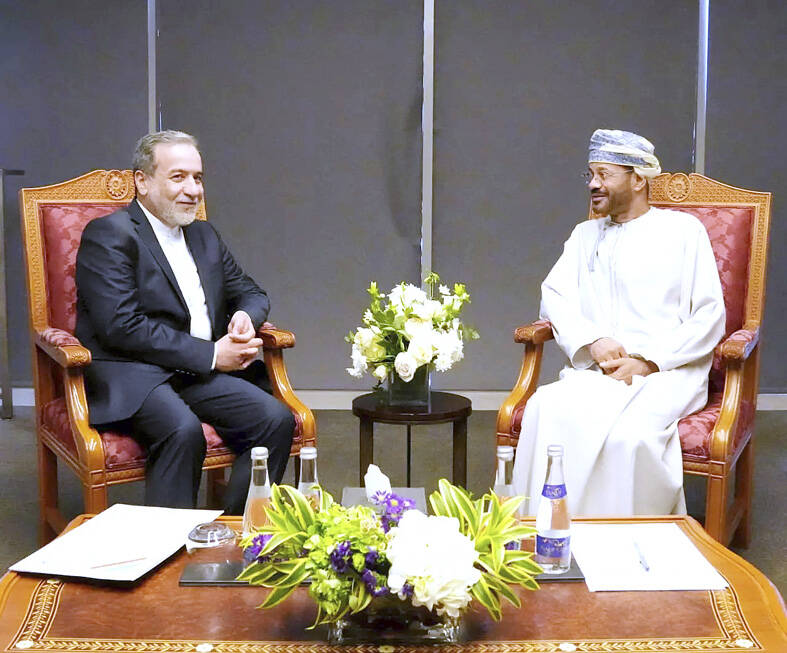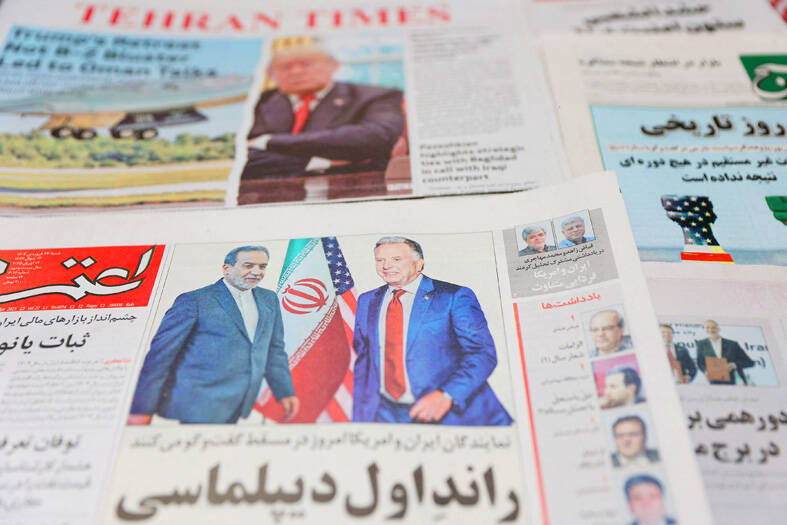The US and Iran were to begin high-stakes talks on Tehran’s nuclear program yesterday, with US President Donald Trump threatening military action should they fail to produce a new deal.
They would be the highest-level discussions between the foes since an international agreement on Iran’s nuclear program crumbled with Trump pulling out in 2018 during his first term in office.
Trump’s special envoy Steve Witkoff and Iranian Minister of Foreign Affairs Abbas Araghchi were to lead the discussions behind closed doors in Muscat, the capital of Oman, which has long played a mediating role between Iran and Western countries.

Photo: AP
Iran’s official IRNA news agency yesterday morning said that the delegation headed by Araghchi had departed Tehran for Muscat.
“I want Iran to be a wonderful, great, happy country, but they can’t have a nuclear weapon,” Trump told reporters aboard Air Force One, hours before the talks were due to begin.
He had made a surprise announcement on Monday that the talks would occur.

Photo: Reuters
Iranian supreme leader Ayatollah Ali Khamenei’s adviser Ali Shamkhani said Tehran was “seeking a real and fair agreement,” adding that “important and implementable proposals are ready.”
If Washington showed goodwill, the path forward would be “smooth,” he said on social media platform X.
The format for the talks has not been confirmed, with the US calling them direct talks, but Iran insisting on an intermediary.
The delegations would start indirect negotiations after a meeting with Omani Minister of Foreign Affairs Badr bin Hamad al-Busaidi, Iranian news agency Tasnim said.
The talks were expected to begin in the afternoon with Busaidi acting as an intermediary, Tasnim added.
Trump announced the talks during a White House press appearance with Israeli Prime Minister Benjamin Netanyahu, Iran’s arch-foe.
The contact between the two sides, who have not had diplomatic relations for decades, follows repeated threats of military action by the US and Israel.
Asked what would happen if the talks fail to produce a deal, Trump said: “If it requires military, we’re going to have military.”
SANCTIONS
Responding to Trump’s threat, Tehran said it could expel UN nuclear inspectors, a move that Washington warned would be an “escalation.”
Iran, weighed down by years of sanctions and weakened by Israel’s pummeling of its allies Hezbollah in Lebanon and Hamas in Gaza, has strong incentives to negotiate.
The US wants to stop Iran from ever getting close to developing a nuclear bomb.
The 2015 deal that Trump withdrew from aimed to render it practically impossible for Iran to build an atomic bomb, while at the same time allowing it to pursue a civil nuclear program.
The UK, China, France, Russia and Germany were the other parties to the agreement, of which Araghchi was a key architect.
Witkoff told the Wall Street Journal that “our position today” starts with demanding that Iran completely dismantle its nuclear program — a view held by hardliners around Trump that few expect Iran would ever accept.
“That doesn’t mean, by the way, that at the margin we’re not going to find other ways to find compromise between the two countries,” Witkoff told the newspaper.
“Where our red line will be, there can’t be weaponization of your nuclear capability,” he said.
NUCLEAR PROGRAM
Iran, which insists its nuclear program is for civilian purposes only, stepped up its activities after Trump abandoned the 2015 agreement.
The latest International Atomic Energy Agency report cited “serious concern” that Iran had an estimated 274.8kg of uranium enriched to 60 percent, nearing the weapons grade of 90 percent.
Ali Vaez, an Iran specialist at the Crisis Group, a US-based think tank, said agreeing on the scope of the talks would be “one of the first and most consequential issues.”
“Iran does not want an expanded agenda in the early stages, but no deal will be sustainable unless it becomes more comprehensive,” he said.
Iran is “likely to engage on steps to roll back its nuclear program, but not dismantle it entirely” in exchange for sanctions relief, Vaez added.
REGIME SURVIVAL
Karim Bitar, a Middle East Studies lecturer at Sciences Po University in Paris, said negotiations “will not focus exclusively on... the nuclear program.”
“The deal would have to include Iran stopping its support to its regional allies,” a long-standing demand by US allies in the Gulf, he said.
For Iran, it could be a matter of the government’s very survival.
“The one and only priority is the survival of the regime, and ideally, to get some oxygen, some sanctions relief, to get their economy going again, because the regime has become quite unpopular,” Bitar said.

Packed crowds in India celebrating their cricket team’s victory ended in a deadly stampede on Wednesday, with 11 mainly young fans crushed to death, the local state’s chief minister said. Joyous cricket fans had come out to celebrate and welcome home their heroes, Royal Challengers Bengaluru, after they beat Punjab Kings in a roller-coaster Indian Premier League (IPL) cricket final on Tuesday night. However, the euphoria of the vast crowds in the southern tech city of Bengaluru ended in disaster, with Indian Prime Minister Narendra calling it “absolutely heartrending.” Karnataka Chief Minister Siddaramaiah said most of the deceased are young, with 11 dead

By 2027, Denmark would relocate its foreign convicts to a prison in Kosovo under a 200-million-euro (US$228.6 million) agreement that has raised concerns among non-governmental organizations (NGOs) and residents, but which could serve as a model for the rest of the EU. The agreement, reached in 2022 and ratified by Kosovar lawmakers last year, provides for the reception of up to 300 foreign prisoners sentenced in Denmark. They must not have been convicted of terrorism or war crimes, or have a mental condition or terminal disease. Once their sentence is completed in Kosovan, they would be deported to their home country. In

Brazil, the world’s largest Roman Catholic country, saw its Catholic population decline further in 2022, while evangelical Christians and those with no religion continued to rise, census data released on Friday by the Brazilian Institute of Geography and Statistics (IBGE) showed. The census indicated that Brazil had 100.2 million Roman Catholics in 2022, accounting for 56.7 percent of the population, down from 65.1 percent or 105.4 million recorded in the 2010 census. Meanwhile, the share of evangelical Christians rose to 26.9 percent last year, up from 21.6 percent in 2010, adding 12 million followers to reach 47.4 million — the highest figure

LOST CONTACT: The mission carried payloads from Japan, the US and Taiwan’s National Central University, including a deep space radiation probe, ispace said Japanese company ispace said its uncrewed moon lander likely crashed onto the moon’s surface during its lunar touchdown attempt yesterday, marking another failure two years after its unsuccessful inaugural mission. Tokyo-based ispace had hoped to join US firms Intuitive Machines and Firefly Aerospace as companies that have accomplished commercial landings amid a global race for the moon, which includes state-run missions from China and India. A successful mission would have made ispace the first company outside the US to achieve a moon landing. Resilience, ispace’s second lunar lander, could not decelerate fast enough as it approached the moon, and the company has